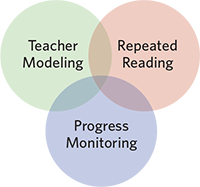To align to the requirements for Every Student Succeeds Act (ESSA, 2015), educators must select interventions that are evidenced-based. Read Naturally has done the groundwork for you and provides easy access to the studies that prove that Read Naturally is evidence-based and therefore effective in increasing student achievement.
The Read Naturally Strategy is well established as research-based, thanks to the high-quality research that informs the development of our programs and inspires our decisions as an educational publisher. The Read Naturally Strategy also clearly meets the criteria for evidence-based according to ESSA.
ESSA defines “evidence-based” as any school “activity, strategy, or intervention” that,
demonstrates a statistically significant effect on improving student outcomes or other relevant outcomes based on: a) Strong evidence from at least one well-designed and well-implemented experimental study; b) moderate evidence from at least one well-designed and well-implemented quasi-experimental study; or c) promising evidence from at least one well-designed and well-implemented correlational study with statistical controls for selection bias...and includes ongoing efforts to examine the effects of such activity, strategy, or intervention (ESSA, 2015, pp. 290).
A university researcher recently reviewed a number of research studies examining the effectiveness of Read Naturally interventions and found substantial evidence to support the use of the Read Naturally Strategy under ESSA.
Danielle Dupuis, Ph.D., Assistant Director for Research and Assessment at the University of Minnesota’s Center for Applied Research and Educational Improvement, reviewed several studies of Read Naturally and found the following:
- Two studies provide strong evidence for the effectiveness of the Read Naturally Strategy.
- Four studies provide moderate evidence for the effectiveness of the Read Naturally Strategy.
- Three studies provide promising evidence for the effectiveness of the Read Naturally Strategy.
Dr. Dupuis also found that multiple studies show that the Read Naturally Strategy is an effective intervention, but those studies did not meet the definition of "evidence-based" due to methodological flaws in the studies' designs, not because Read Naturally was ineffective for the students in the studies.
Because the definition of evidence-based under ESSA requires there be “at least one” study on a particular outcome for the intervention to be considered evidence-based for that outcome, Dupuis concluded that, “there is substantial evidence to support the use of Read Naturally by state and local education agencies, including multiple demonstrations of strong evidence under ESSA.”
As Dupuis’ research shows, well-designed studies that implement Read Naturally interventions with fidelity consistently demonstrate the effectiveness of the Read Naturally Strategy. Educators who choose Read Naturally can be confident they are bringing a research-based, evidence-based, and highly effective solution to their students. Click here to see Dr. Dupuis’ findings of substantial evidence to support the use of Read Naturally under ESSA.
 Share your student’s success story—nominate him or her for our Star of the Month award. Win a Barnes & Noble gift card for the student and a Read Naturally gift certificate for your class!
Share your student’s success story—nominate him or her for our Star of the Month award. Win a Barnes & Noble gift card for the student and a Read Naturally gift certificate for your class!
Post a New Comment